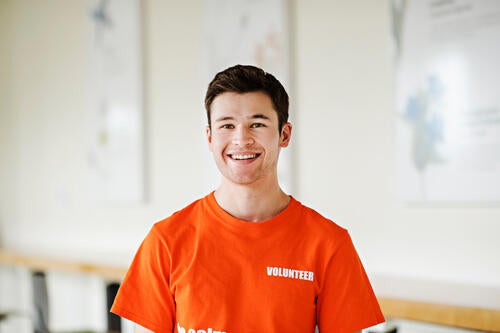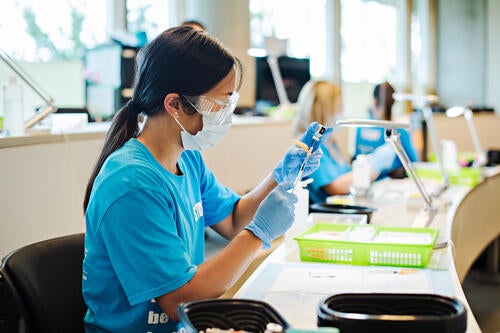
Every shot, a shot of gold
Interdisciplinary teamwork invaluable to health-care system

Interdisciplinary teamwork invaluable to health-care system
By Milana Madzarac School of PharmacyThe Waterloo School of Pharmacy implemented a mass vaccination clinic for COVID-19 immunization in 2021.
With many multidisciplinary teams working together in an environment not built for such a complex clinical system, researchers at the University of Waterloo created an app to support front-line workers. The app streamlined information flow to help solve logistical challenges that arose.
“Utilizing interdisciplinary teams lead to more optimal outcomes,” says Ryan Tennant, a PhD student in Engineering at the University of Waterloo. “Working with the School of Pharmacy cemented the importance of actively embracing the interdisciplinary approach to foster collaborations and break down barriers.”

Ryan Tennant, a PhD student in the Faculty of Engineering, worked with researchers and students from the School of Pharmacy on an interdisciplinary project to support frontline health-care workers.
By witnessing the stresses in this emergency space, Tennant recognized that he had the knowledge and tools that could help alleviate some of the burden the volunteer team was facing.
“Embedding the engineer in the health-care team, rather than inviting an engineer to solve a problem, is the key to successful interdisciplinary work,” says Dr. Kelly Grindrod, a professor at the University of Waterloo School of Pharmacy.
Dr. Catherine Burns, Tennant’s co-supervisor and a professor at the Faculty of Engineering at the University of Waterloo agrees.
“If we want to complete work that has an impact and that will make a difference, we must have a range of engaged stakeholders at the table. From this we will see that our engineering advancements will have an impact on real people and real problems,” Burns says.

A health-care worker prepares a vaccine dose at the Waterloo vaccine clinic.
Tennant’s work aimed to use every vaccine dose while automating workflow and reducing stress on the workers administering vaccine doses.
Solving real-world problems
Before Tennant’s app, the clinic lead and the pharmacists were under tremendous pressure to track each dose and every person while accounting for vials that had a different dose than expected.
“Every shot was a shot of gold,” Burns says. “The clinic would have to stop client flow to re-organize and count doses to ensure none were wasted.”
Tennant’s app brought that situational awareness into real-time, helping to provide clinic leads with all information earlier so the clinic did not have to stay open longer to use all the doses.
This research highlights the importance of interdisciplinary teamwork to solve real-world problems.
Future of engineers in healthcare
The collaboration showed the possible role engineers could play in health care and emergency response spaces. Engineers understand how systems work and can help reduce the workload of frontline workers to prevent burnout, promote longevity in the workforce and help teams work together to communicate efficiently.
“If we want to innovate the space well, we need to place engineering students in health-care systems during their co-op work terms to give them the experiences right from the start,” Grindrod says.
Tennant co-authored two recent studies with Grindrod and Burns, along with colleagues at Umea University. The papers “Understanding Human Factors Challenges on the Front Lines of Mass COVID-19 Vaccination Clinics: Human Systems Modeling Study” and “Multi-Disciplinary Design and Implementation of a Mass Vaccination Clinic Mobile Application to Support Decision-Making” were published in the Journal of Medical Internet Research Human Factors and the IEEE Journal of Translational Engineering in Health and Medicine.

Read more
Waterloo School of Pharmacy co-op student invaluable to industry

Read more
Waterloo School of Pharmacy alum speaks to the benefits of the Minor Ailments Program

Read more
Waterloo School of Pharmacy professor Dr. Nardine Nakhla launches new digital health tool
The University of Waterloo acknowledges that much of our work takes place on the traditional territory of the Neutral, Anishinaabeg, and Haudenosaunee peoples. Our main campus is situated on the Haldimand Tract, the land granted to the Six Nations that includes six miles on each side of the Grand River. Our active work toward reconciliation takes place across our campuses through research, learning, teaching, and community building, and is co-ordinated within the Office of Indigenous Relations.